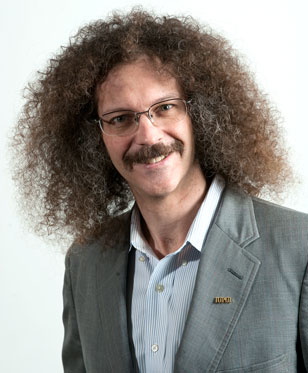Last modified: Monday, October 25, 2010
Just-in-Time Teaching, an IUPUI innovation now used nationwide
FOR IMMEDIATE RELEASE
Oct. 25, 2010
INDIANAPOLIS -- A student-focused Web-based teaching and learning strategy developed in the School of Science at Indiana University-Purdue University Indianapolis is now in use on college campuses across the country, helping professors present material at a level customized to the educational backgrounds, interests, perspectives and capabilities of students in their classrooms. The strategy provides constant feedback to both teachers and students at exactly the time they need it.
The idea behind Just-in-Time Teaching (JiTT) is deceptively simple -- ask students to answer a few questions about each reading assignment before the material is discussed in class. Giving students and faculty this opportunity to get "on the same page" can mean the difference between a successful college experience and a discouraging one, and ultimately the difference between graduating and dropping out.
JiTT rapidly and repeatedly determines the appropriate level of instruction to motivate each student. Following homework assignments, students take online quizzes to determine their mastery of the material. For example, students in a basic physics class might be asked to answer: "If an operational refrigerator is left with its door open in a sealed room, would the temperature in the room go up or down"? Responses indicate to the course instructor whether the students understood the reading on thermodynamics. Students in a course for science or engineering majors might be presented with a more open-ended question on thermodynamics: "Is it possible to add heat to an ideal gas such as helium without raising its temperature"?
Professors who employ JiTT use students' responses to determine how well they have mastered the material and thus how to proceed with the instruction, and as jumping off points for classroom discussion.
"Through JiTT we are leveraging homework time to find out what our students need from us. As with just-in-time delivery in the manufacturing context, which lets the parts supplier knows what the assembly line needs and allows for adjustments for that need, with JiTT we get information from students about what they need and can adjust our teaching," said Andrew Gavrin, department chairman and associate professor of physics in the School of Science at IUPUI. He is the co-developer of JiTT and frequently makes presentations on JiTT to interested universities. Later this year he will introduce the concept to Morehouse College in Atlanta.
Web-based JiTT was born in the mid-1990s when the Internet was in its infancy and few course websites existed. Gavrin and Gregor Novak, of the physics department at IUPUI and colleague Evelyn Patterson, with the U.S. Air Force Academy, conceived of JiTT as a means to promote physics instruction as dialogue designed to meet the needs of their students.
"JiTT benefits students because it accommodates their different motivations and needs as well as their comprehension of the material, in a way that allows for their teachers to respond quickly while the chapter or unit is being taught. This is especially important when what is being taught builds on what was learned previously. JiTT benefits faculty because it allows them to see each student's progress in a more intimate way and respond to individual needs quickly," said Gavrin.
Today Web-based, classroom-linked JiTT is used in courses in science, the humanities, business and other fields on large and small college campuses across the country from IUPUI and the U.S. Air Force Academy (both early adoptors) to Harvard University and Davidson College and many other institutions. JiTT is popular because it is easily adaptable to various student needs and a wide range of course material.
About the School of Science
The School of Science is committed to excellence in teaching, research, and service in the biological, physical, behavioral and mathematical sciences. The School is dedicated to being a leading resource for interdisciplinary research and science education in support of Indiana's effort to expand and diversify its economy. For more information visit www.science.iupui.edu.
For more information, contact Cindy Fox Aisen at 317-274-7722 and caisen@iupui.edu.
